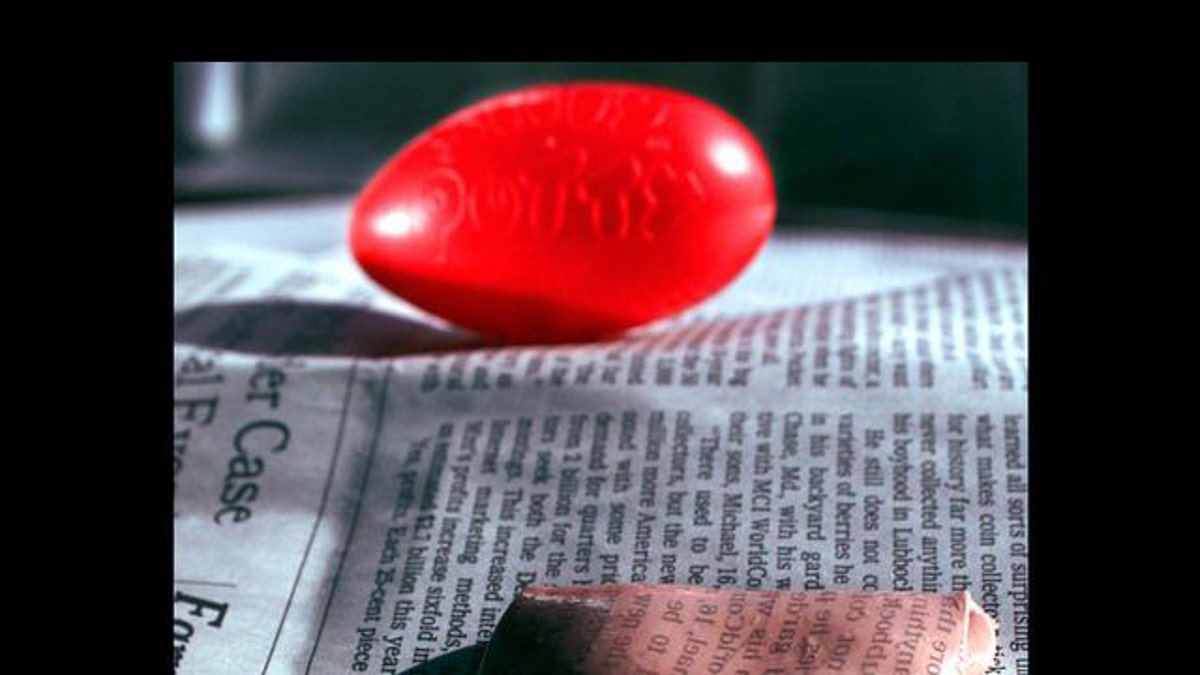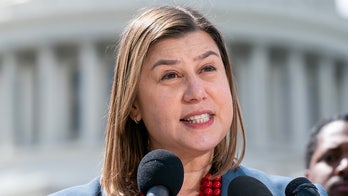
If he accomplished nothing else in last night’s last-in-the series presidential debate, Republican contender Mitt Romney may finally have put to rest one of the most persistent and damning slams against his character and his campaign – that he was an Etch-A-Sketch candidate, always just one a question away from shaking himself up and starting fresh with a blank slate.
Unfortunately for him, he vanquished that meme by morphing into another plaything from our pre-digital past: Silly Putty.
You remember Silly Putty, don’t you -that odd, colorless, shapeless ball of polymers that comes in a bizarre but unthreatening little plastic egg?
It is malleable, ultimately formless, you can push it, pull it, bounce it, and when you really get bored, you can press it down hard on another relic of the past, the Sunday comics, peel it off, and find, as if by magic, that the Silly Putty has made an exact copy of whatever had been on the page, a copy you can then bend and tug into all kinds of grotesque parodies of the original.
Last night in Boca Raton, on foreign policy, but even at times when the debate drifted off into domestic issues, Etch-A-Sketch Romney became Silly Putty Romney.
Romney jettisoned his harsh denunciations of the president’s policies, the red meat that had played so well in the red state primaries, and opted for a gauzy embrace of those same policies.
He almost gleefully abandoned the hard-line positions he’s taken over five long years of campaigning and wrapped himself so tightly around President Obama’s positions -on everything from the rising economic threat posed by China, to the existential risk of a nuclear Iran, even to the auto bailout- that you couldn’t tell the difference between them.
Time after time, in response to direct questions from moderator Bob Schieffer or in response to the President himself, Romney jettisoned his harsh denunciations of the President’s policies, the red meat that had played so well in the red state primaries, and opted for a gauzy embrace of those same policies.
Romney jettisoned his harsh denunciations of the president’s policies, the red meat that had played so well in the red state primaries, and opted for a gauzy embrace of those same policies.
He seemed even more enthusiastic about the President’s plans to pull troops out of the decade-long quagmire in Afghanistan than the President did. That despite the fact that Romney had spend much of the primary season blasting Obama for telegraphing our exit to the Taliban.
On Syria, he appeared to endorse Obama’s stance of identifying and encouraging moderate forces working to overthrow Assad, and offered no alternative to the regimen of stiff economic sanctions imposed on Iran to keep that country from developing nuclear weapons, issues on which he had previously derided the President for “leading from behind” or worse, for appearing weak and ambivalent.
Or take the issue of America’s relationship with Israel.
After hammering Obama for months on the campaign trail for allegedly wanting to “put daylight” between us and the Netanyahu government, Romney ended up sounding like a pale copy of the President.
After criticizing the President for failing to visit Israel during his whirlwind tour of the Middle East in 2009, Romney slipped into a brittle silence when Obama dryly noted that when he had visited Israel a year earlier he had gone to the Holocaust Museum at Yad Vashem, and tacitly implied that Romney’s visit to the Levant last summer had more to do with public relations and fundraising than foreign policy.
“When I went to Israel as a candidate, I didn’t take donors, I didn’t attend fundraisers.”
And even when he had an opportunity to press the President, to articulate an agenda that would go beyond Obama’s, Romney held back.
He didn’t make any particular effort on the issue of the Sept. 11 attack on the U.S. consulate in Benghazi, an issue on which the President has some vulnerability.
Nor was there any significant talk about Latin America.
And there was nothing about the issue of guns and drug violence in México, this nation’s largest trading partner, again an issue about which this administration has some questions to answer.
In a debate held in Florida, a state with a politically crucial Cuban community, there was no talk about our policy toward Cuba and its hostile regime, only 90 miles away.
The debate’s opening even gave the candidates an opening to talk about Cuba - to no avail.
Moderator Bob Schieffer kicked off the debate by noting that it was taking place on the 50th anniversary of the Cuban Missile Crisis, “perhaps the closest we've ever come to nuclear war.”
“And it is a sobering reminder,” the moderator said, “that every President faces at some point an unexpected threat to our national security from abroad.”
But even with Cuba’s government now at the crossroads of an unclear change – some it intentional, some not, with Fidel Castro’s precarious health – and no lack of hostility toward the United States, the only other acknowledgment of the island nation that has helped breed the likes of Hugo Chávez in Venezuela came with a fleeting mention of “Castro” by Romney.
In fact, Latin American issues were mentioned only twice and in passing, once when Romney told the moderator that in terms of trade “Latin America is a huge opportunity for us,” and again, when he included Fidel Castro and Chávez in a brief list of guys around the world we don’t like.
That’s it. Neither candidate, nor the moderator, made an effort to take the exchange any further.
Even when he spoke about China, a country that Romney has repeatedly pilloried for alleged currency manipulation and unfair trade practices, Romney seemed to fumble.
It was hard to take his protests seriously about China stealing our intellectual property when he seemed to spend the better part of the debate stealing the President’s intellectual property.
Obama hardly sat back.
He was far more animated than he was in his first debate with Romney, and far more measured than he was in the second.
And he fired off a few good lines, such as when he chastised Romney for his changing positions on Iraq and Afghanistan, saying: “Not only were you wrong, but you were also confusing and sending mixed messages both to our troops and our allies.”
And the President took Romney to task, with just a bit of snark, for his comment last summer identifying Russia as this nation’s greatest geopolitical opponent, saying “I’m glad that you recognize that Al Qaeda is a threat because a few months ago when you asked what’s the biggest geopolitical threat facing America, you said Russia – not Al Qaeda – you said Russia. The 1980s are now calling and asking for their foreign policy back.”
To his credit, Romney pushed back.
“I have clear eyes on this. I’m not going to wear rose-colored glasses when it comes to Russia or Mr. (Vladimir) Putin,” Romney said. “And I’m certainly not going to say to him, ‘I’ll give you more flexibility after the election.’ After the election, he’ll get more backbone.”
But Romney’s reply seemed to lack vigor, as did many of his responses throughout the evening.
It was, in general, a lackluster performance.
Romney seemed to be trying so hard to appear measured, to look presidential and Obama-like in so many respects, that even when he did try to score points, he left himself open.
His half-hearted attack on the Obama administration for maintaining fewer Navy ships than in 1917 sparked the most withering riposte of the night.
“You mention the Navy, for example, and that we have fewer ships than we did in 1916. Well, governor, we also have fewer horses and bayonets,” Obama replied.
Then, eschewing both the Etch-A-Sketch and Silly Putty, Obama tagged Romney with yet another childhood pastime. “It’s not a game of Battleship.”
Presumably Romney now agrees that we need fewer horses and fewer bayonets. And petards. We definitely need fewer petards.
You can understand, of course, why Romney decided to retreat back to the Silly Putty approach to last night’s debate.
After all, this election, just two weeks away, will be decided by undecided voters.
And just like the rest of us, many of those still undecided voters are war-weary after more than a decade of unrelenting conflict.
Just like the rest of us, many of them are not particularly interested in foreign affairs – it’s possible that Romney, who brought up Mali three times in last night’s debate was one of only three people in the room who knew where Mali is.
What those undecided voters were looking for last night, I suspect, was a sense that Mitt Romney, who has surrounded himself with advisors who are veterans of the last Republican administration, would not be George W. Bush Part II.
And Romney tried to reassure them, saying, “we don’t want another Iraq, we don’t want another Afghanistan.”
It’s far from clear, however, that he succeeded.
The snap polls taken after last night’s debate indicate that by wide margins, most voters gave Obama the edge.
And it’s doubtful that the results of the debate will translate into any kind of significant bounce in the polls going into Election Day.
But it doesn’t need to be significant. The race remains virtually deadlocked. A comparative handful of undecided voters swayed one way or the other could make the difference.
The question is, have those voters discovered what the rest of us discovered about Silly Putty a long time ago: that as much fun as it might be, no matter how hard you press the stuff against the newspaper, no matter how hard you try to hold it there, the image you get is never as crisp or clear as the original.




